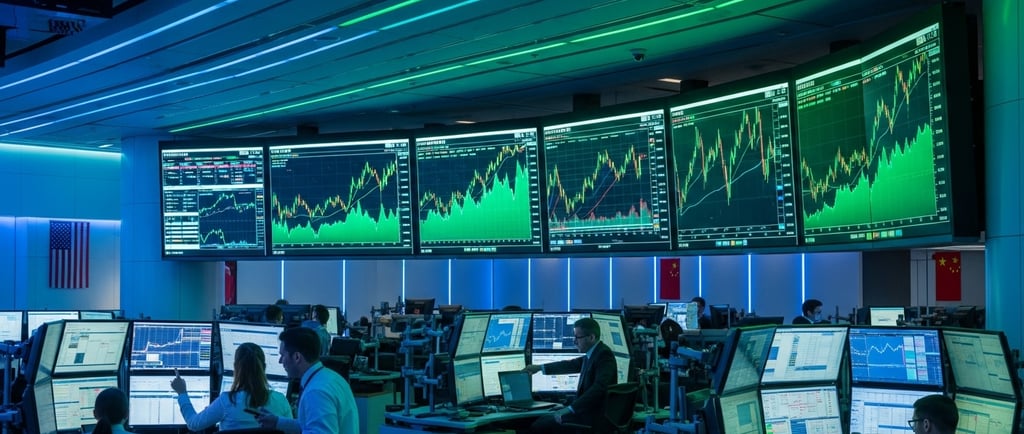NY Futures Rally After Sharp Drop: Trump Eases China Tensions With New Statement
Markets bounce back as investors digest softer tone from US President
Cristian Ianowich
10/13/20253 min read


Markets bounce back as investors digest softer tone from US President
If you've been watching the markets lately, you know it's been a wild ride. But here's some good news: after Friday's brutal selloff, US futures markets opened higher on Sunday (October 12th), and it's all thanks to some calmer words from President Donald Trump about China.
Let me break down what's happening and why this matters for your investment strategy.
US Futures Jump as Trump Changes His Tone
The futures contracts told an encouraging story on Sunday evening:
Dow Jones futures: Up 323 points (approximately 0.7%)
S&P 500 futures: Rising 0.9%
Nasdaq 100 futures: Climbing 1%
After Friday's massive $2 trillion market wipeout (yes, you read that right), investors were understandably nervous. But then Trump posted on Truth Social, his social media platform, and the mood shifted dramatically.
What Did Trump Say That Changed Everything?
Here's the thing: Trump had previously threatened "massive tariff increases" on Chinese products, which sent shockwaves through global markets. But on Sunday, he struck a completely different tone.
"Don't worry about China, everything will be fine!" Trump wrote. "The highly respected President Xi just had a bad moment. He doesn't want a depression in his country, and neither do I. The US wants to help China, not hurt it."
This reassurance was exactly what jittery investors needed to hear. It suggests that maybe—just maybe—this trade war escalation won't spiral out of control.
Want to understand how geopolitical events affect your portfolio? Learning to read these market signals is crucial for making smarter investment decisions.
The Damage From Friday's Tariff Announcement
Let's rewind for a second. On Friday, Trump announced 100% tariffs on China, reigniting the trade war between the world's two largest economies. The reaction was swift and painful:
Markets lost approximately $2 trillion in value (according to CNBC calculations)
The S&P 500 dropped 2.7%—its worst single-day performance since April
All three major indices suffered their worst week in months
For the full week, the losses were substantial:
Dow Jones: -2.7%
S&P 500: -2.4%
Nasdaq: -2.5%
If you felt your portfolio taking a hit, you weren't alone. This was a market-wide panic.
Is the Trade War Really Cooling Down?
Vice President JD Vance also helped calm nerves over the weekend. In a Fox News interview, he maintained a more conciliatory tone, saying the US is willing to negotiate "if Beijing is willing to be reasonable."
Vance added that the US has "many more cards up its sleeve" if things don't go well—but the key takeaway was that negotiation is still on the table.
According to a US representative, China had been "stalling" in communications with the US regarding rare earth elements, which are critical for technology manufacturing. But the overall message from Washington shifted from confrontation to cautious diplomacy.
Here's what this means for you: Market volatility creates both risks and opportunities. Understanding these patterns helps you avoid panic selling and potentially spot buying opportunities.
What Else Is Moving Markets This Week?
Beyond the trade drama, there are two other major factors investors are watching:
1. Government Shutdown Risk
The US government's payroll deadline expires on Wednesday, October 15th. If Congress doesn't act, many federal employees may not receive their paychecks, which could further rattle economic confidence.
2. Bank Earnings Season Kicks Off
Major financial institutions will report their quarterly results this week:
Tuesday (14th): Citigroup, Goldman Sachs, Wells Fargo
Wednesday (15th): JPMorgan Chase, Bank of America, Morgan Stanley
These earnings reports will give us crucial insights into the health of the US economy and whether consumers and businesses are still spending despite all the uncertainty.
How Should Investors React?
Look, I get it—this volatility is stressful. One day markets are crashing, the next they're bouncing back. It's enough to make anyone dizzy.
But here's the reality: this is exactly why having a solid investment strategy matters more than ever. Emotional reactions lead to poor decisions. Understanding the bigger picture helps you stay grounded.
Consider this: Are you prepared for continued market swings? Do you have a plan that accounts for geopolitical uncertainty? These are questions every investor should be asking themselves right now.
The Bottom Line: Stay Informed, Stay Prepared
Sunday's market rebound shows that investor sentiment can shift quickly based on new information. Trump's softer stance on China provided temporary relief, but the fundamental issues remain unresolved.
The trade tensions, government shutdown risk, and upcoming earnings season all point to one thing: more volatility ahead.
The smart move? Keep learning, stay diversified, and don't let short-term market moves derail your long-term strategy.
Ready to navigate these turbulent markets with confidence? The difference between successful investors and everyone else often comes down to knowledge and preparation. Understanding how to read market signals, interpret geopolitical events, and manage risk during uncertain times is essential.
Whether markets go up or down this week, one thing is certain: those who understand what's happening and why will always have the advantage.
